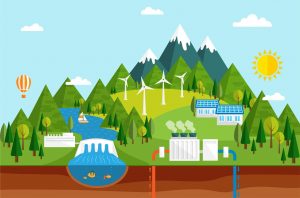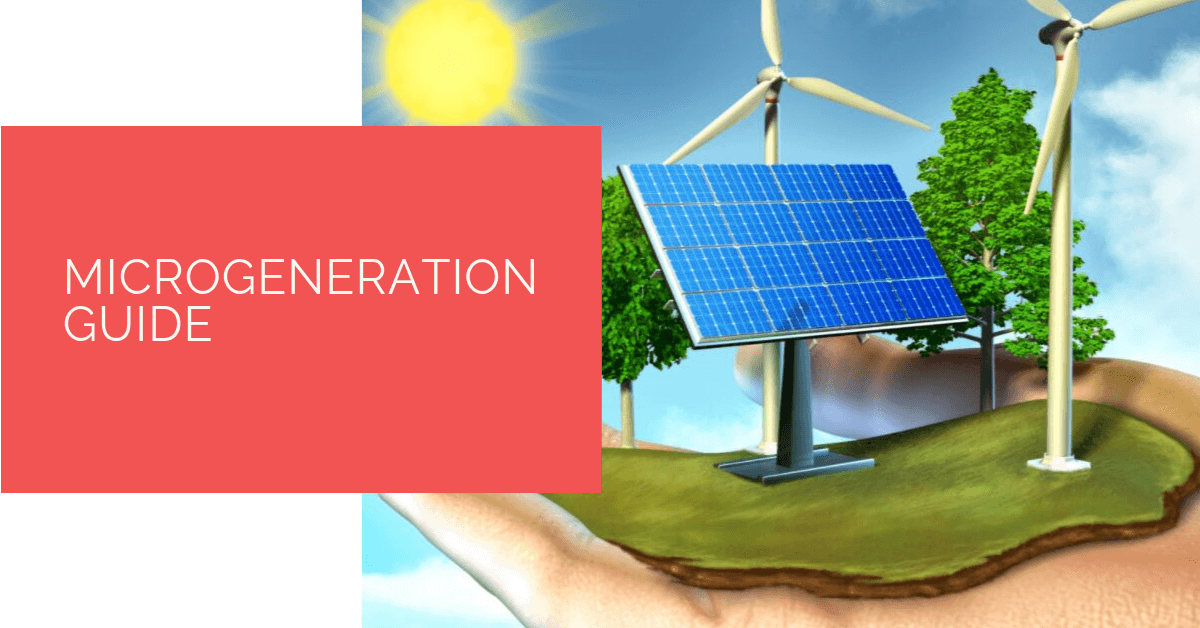Energy costs are rising, and as a culture we are becoming more and more aware of the impact that our lifestyles have on the environment. It is vital that we find ways to reduce our carbon footprints, not just for our wallets, but for the planet.
Microgeneration is something that many homeowners are turning to as a way of saving money and also doing their bit for the environment.
Contents
Key Takeaways
- Microgeneration is a way to produce electricity for home use, reducing dependence on non-renewable energy sources, lowering energy bills, and contributing to environmental sustainability.
- Various microgeneration technologies are available, including solar panels, wind turbines, hydro turbines, anaerobic digesters, micro-combined heat and power, ground source heat pumps, and air source heat pumps.
- The advantages of microgeneration include cost savings, increased property value, and eco-friendliness, making it a viable option for homeowners with suitable conditions and energy needs.
What is Microgeneration?
Microgeneration is the term used to describe ways of producing electricity for use in the home. It is unlikely that microgeneration would allow a household to go completely “off the grid” but it can greatly offset a family’s energy use, which reduces their dependence on non-renewable energy sources, reduces energy bills, and is a small step toward going green.
There are many ways of generating power, and while some of them are expensive, some are not. Some people manage to make some money from power generation by selling excess power back to the national grid.
How is Power Generated using Microgeneration Technologies?
 There are several different types of microgeneration. Some power sources are affordable and useful for homeowners, some are a little more expensive to get started with. Which power sources are practical in your home will depend on the area in which you live, the size of your property, and whether it is on a hill or not. Microgeneration is a useful form of power and there is likely going to be something that will work for you.
There are several different types of microgeneration. Some power sources are affordable and useful for homeowners, some are a little more expensive to get started with. Which power sources are practical in your home will depend on the area in which you live, the size of your property, and whether it is on a hill or not. Microgeneration is a useful form of power and there is likely going to be something that will work for you.
Types of Microgeneration Technologies
Solar Panels
Solar or photovoltaic panels remain one of the most common microgeneration technologies. They can be useful, even in the UK, since modern panels have improved to the point that you don’t need to have exposure to direct sunlight to get some power. You do need a decent amount of ambient daylight, though, and the more sun exposure your property gets, the better. Properties that are in the shade will not benefit as much.
Wind Turbines
Wind turbines take power from the wind, as their name suggests. To be useful, they usually need to be in an unobstructed area, and can stand 2m to 8m tall. The amount of energy that a wind turbine can produce will depend on the amount of wind that the area sees. These are unpopular in built up areas because some people think of them as being eyesores. However, they can be a good source of energy on farmland or larger private properties.
Hydro Turbines
Hydro turbines are a practical solution for people who are lucky enough to have a source of flowing water such as a stream on their property. The water turns a motor which produces electricity. This is a reliable source of energy because the water doesn’t stop flowing, so energy will be generated 24 hours a day, unlike with PV panels or wind turbines, which can be at the mercy of the weather.
Anaerobic Digesters / Biomass
This type of microgeneration is similar to composting. Plant or animal materials are broken down by micro-organisms and will release biogas, which can then be used to generate both heat and power. This works well on farms. It can be done on a smaller scale as well, but the return on investment is lower.
Micro Combined Heat and Power
Currently, CHP relies on mains gas, but it is still thought of as being better than other fossil fuel sources. The system uses a traditional boiler for heat, but will also generate electricity while it is in use.
Ground Source Heat Pumps
Ground Source Heat Pumps rely on pipes that are buried underground to extract heat from the earth, which is then used to warm radiators or to provide underfloor heating. To use one of these you would need a garden where it is possible to big a trench for the underground loops. This solution is a good option for people who rely on electricity or coal for heating. The return on investment will be lower for homes that rely on mains gas.
Air Source Heat Pumps
Air source heat pumps are similar to ground source heat pumps, except that they use the warmth from outside rather than from underground. They pick up the heat, and then use a compressor to generate even more heat, then use that to power underfloor heating, water supplies or radiators. They can be effective in areas where there is a decent amount of ambient warmth to take advantage of. They will not work as well in colder climates.
What Are the Advantages of Microgeneration?
Microgeneration is a good option if you have a small home and modest heat requirements, or if you have a nice open roof that is exposed to the sun or a large garden where you don’t mind using wind or water-based power.
It can save many homeowners a lot of money, and it can also help to add value to your home. If you invest in microgeneration and take advantage of feed-in tariffs, then should you come to sell your property in the next few years you will find that it is more appealing to prospective buyers because of the benefits of the feed-in tariff.
Not all properties will benefit from microgeneration, and there are many other things that you can do to improve the eco-friendliness of your home. Before you spend a lot of money on power, look at double glazing, insulation, and other general ways of reducing your energy consumption. They can be high-impact ways of saving money on your bills.
If you have a modern property, however, and want to go the extra mile then a microgeneration could well be the next step forward towards making a home that is as sustainable as it can be. As the concept becomes more common, a growing number of families are looking to add solar, wind power or install UK heat pumps to their homes, so resistance to visible power sources is declining as people appreciate how important they are for the environment as a whole.
Heat Pump Source: Reliable Heating and Cooling Solutions
At Heat Pump Source, we take pride in our unwavering commitment to serving the UK with top-tier HVAC solutions. From the efficiency of heat pumps and the cool relief of air conditioning to the warmth of boilers, radiators, and underfloor heating, our dedicated team is always at the forefront of innovation. We understand the unique needs of every household and business, and we strive to provide dependable health and cooling products and services that are tailored just for you. Ensuring your comfort and satisfaction is our utmost priority. Whether you have questions, need guidance, or require support, we’re always here to assist. Please don’t hesitate to contact us; we’re eager to be of service.
Conclusion
Microgeneration offers homeowners an eco-friendly and financially advantageous approach to energy production. By harnessing renewable sources like solar, wind, and hydropower, individuals can reduce their carbon footprint, save on energy costs, and even add value to their properties. While not suitable for every home, microgeneration is becoming an increasingly appealing option for those looking to make their residences more sustainable and environmentally responsible. As the world continues to grapple with rising energy costs and environmental concerns, embracing microgeneration technologies represents a significant step towards a greener, more energy-efficient future.
About the Author
At Heat Pump Source, our articles are the product of a collaborative effort among a team of highly skilled HVAC experts. Our dedicated professionals, hailing from diverse backgrounds in heating, ventilation, air conditioning, and refrigeration, contribute their extensive knowledge and experience to every piece of content. This multidisciplinary approach ensures comprehensive coverage. Our commitment is to deliver authoritative, reliable, and tailored advice to meet the unique needs of every household and business across the UK.

